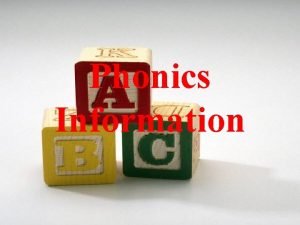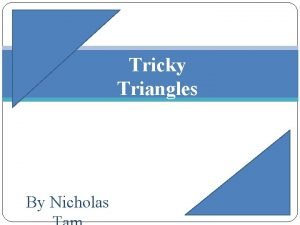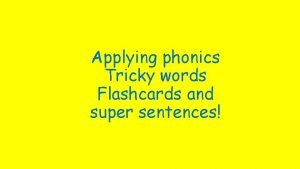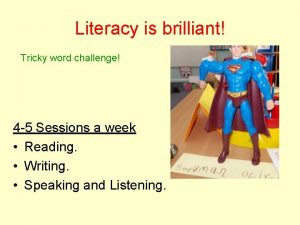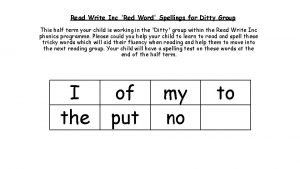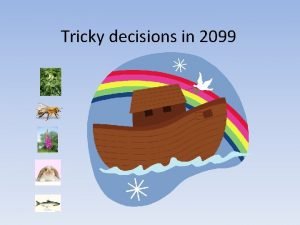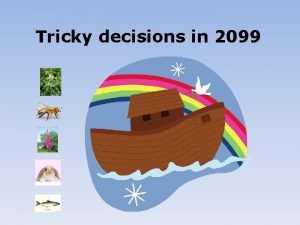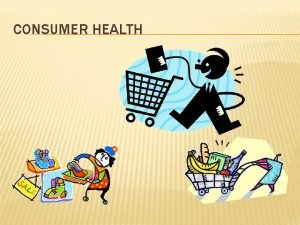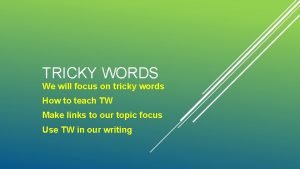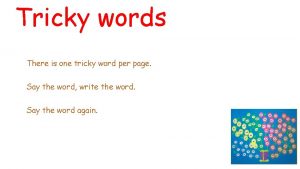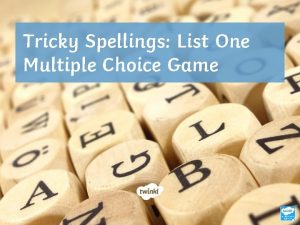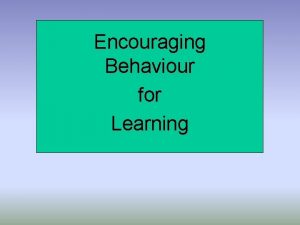Tricky decisions in 2099 Encouraging discussion skills in











- Slides: 11

Tricky decisions in 2099

Encouraging discussion skills in science • An example of a method you could use to raise scientific issues • What do you think? • Can you adapt and expand this activity?

Cf. E Sciences – Principles & Practice • Develop a curiosity and understanding of their environment and their place in the living, material and physical world. • Demonstrate a secure knowledge and understanding of the big ideas and concepts of the sciences. • Recognise the impact the sciences make on their lives, the lives of others, the environment and on society. • Develop an understanding of the earth’s resources and the need to be responsible for them. • Express opinions and make decisions on social, moral, ethical, economic and environmental issues based on sound understanding.

Cf. E Sciences–Experiences & Outcomes I have contributed to discussions of current scientific news items to help develop my awareness of science. (SCN 1 -20 a) I can identify and classify examples of living things, past and present, to help me appreciate their diversity. I can relate physical and behavioural characteristics to their survival or extinction. (SCN 2 -02 a) I can explain some of the processes which contribute to climate change and discuss the possible impact of atmospheric change on the survival of living things. (SCN 3 -05 b)

Tricky Decisions in 2099 READ BY THE TEACHER It is 2099 and it has been raining for nearly 2 years. Water levels in Scotland are dangerously high. Many towns have disappeared as rivers burst their banks and the sea keeps on rising. In one week’s time our school will close and we will get onto ships to try to find dry land. We don’t know where we are going and we don’t know if we are ever coming back. Like many schools we have been asked to take some living creatures with us along with the people. But we cannot take everything and so we have to choose. This class has the hard job of choosing from a group of 5 animals and plants. Form a group of about 4 or 5 pupils and you will be given your task – when you make a choice you have to justify what you do so think carefully and remember everyone’s opinion counts.

The Task: Once in groups the pupils are given the 5 picture cards (numbered 1) as shown above then there are several ways in which you can give the pupils the task: 1. You could tell the pupils that they have to take only 4 animals and plants so they have to decide which one to leave behind. 2. You could tell pupils that they can only take two. 3. You could tell the pupils that they can only take one animal and one plant 4. You could ask them to rank the animals and plants 1 -5 and then look at the whole class results to decide on which ones to take. Once the group has made their choice you then give them the next set of cards (numbered 2) and ask them to make the decision again. This is repeated with the cards 3 and 4 as appropriate to your particular class or group within a class.





Good links If you wish to expand this activity and get the pupils to do a bit of research then the following links will help: 1. Rabbits http: //www. bbc. co. uk/nature/animals/pets/rabbits. shtml 2. Herring -http: //www. ypte. org. uk/environmental/overfishing/29 3. Bees - http: //www. britishbee. org. uk/bees 4 kids/index. php 4. Potatoes - http: //www. britishpotatoes. co. uk/kids/ 5. Foxglove - http: //www. arkive. org/foxglove/digitalispurpurea/threats-and-conservation. html





